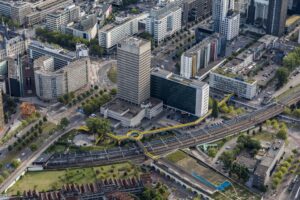When people ask me what your profession is and I respond by saying, I am an urban planner, I see a reflection of surprise on their faces. Then I go ahead to explain what the profession is all about, after which you hear, Oh! Town Planner you mean Aha… It is indeed a less known profession in the modern world. Yes, urban planning is indeed a profession which remains largely unknown to the general public and even to the concerned agencies especially in Nigeria. This is a major setback for the profession, and the magnitude of the problem is not reflected in conventional words. Urban planning to many people connotes different meaning, many times defined from the perception of physical planning and excluding social and economic component of the environment.

Urban Planning: What Do We Know About It?
The problem is the enormous awareness gap. It is easier to say one is among the well-known professions, which include architecture, doctors, lawyers, pilots, builders, chefs, mechanics, even musicians, but not an urban planner. This can be attributed to the less publicised profession and the absence of information about it from the textbooks provided to school kids. Neither do movies ever focus on this profession except for a few cities, nor was any significant attempt made to increase awareness about the same.
Very few individuals (about a millionth fraction of billions of humans) outside the profession are aware of urban planners. Those pursuing planning have a hard time explaining what planners do because of the complete lack of idea about planning in the minds of people. Even after decades of existence of this profession, it remains largely unknown. Among planning professionals, there exists a wide range of perspectives on urban planning. As a result, architects in recent times have begun to study urban planning since many individuals believe it is closer to architecture. It is also easier to communicate architecture than urban planning (the sum of a whole).
Some have a vague idea about the profession and often confuse it with “architecture.” Those who have a slightly better understanding regarding planning define it in their simplest words as professionals who put the right things at the right places by making master plans and policies. There also exists a completely different group of people who think of the profession as similar to a wedding planner, event planner, or just anything with which they can associate physical planning. People recognise that planning is important; however, this is not because of their knowledge about the profession but because of the “obvious” reasons and common sense, as everything requires planning. Many individuals, politicians, and policymakers take the general and dictionary meaning of “planning” into account while developing their understanding of the profession.
What do planners do?
The tricky part is that it’s almost impossible to put urban planning in simple words or 2 to 3 sentences. Squeezing an extensive and immensely broad profession into a few sentences isn’t an easy task. When asked about what urban planners do, they tend to start with phrases like master plans, land use plans, zoning, and policies. The listener becomes clueless about what is being discussed and loses interest. It’s important to be on the same level to make others understand the countless things that planners do and are capable of doing. If a person is interested, then it becomes a remarkable and proud moment to explain your work. Planners do diverse work, including:
- Data analysis and presentation,
- Data mining, preparing good questionnaires for conducting various surveys,
- Policymaking,
A short and straightforward description of planning by Planetizen defines urban planning as “a professional practice and an academic study focused on the future of built environments and connected natural environments, from the smallest towns to the largest cities and everything in between,” making places better by putting the right things in the right place. It is an urban planner’s job to decide which things, like buildings, roads, and parks, should go in which places for aesthetics, environmental, and economic gains. We can categorically define “urban planning” as a process which involves making present and future intelligent decisions that guide human activities in the economic, social, physical and political environment.
Consequently, there is a need to rethink planning in Nigerian cities to ensure sustainable development, looking at smart cities initiatives.
Many people assume that when you say you are a planner that you work as a Development Management Officer for a planning department at a local authority. They think your job is deciding on planning applications and building approvals, saying ‘Yes’ or ‘No’ to requests for house extensions and property development. That is what some planners in the public sector do. But it’s by no means the only option. Whatever route you take as a planner, you can be sure that you’ll be working alongside a diverse range of professionals. In Nigeria, people get into planning to “get a job.” However, studies have shown that passion and the need to make a change and a difference in the world are what make great planners, as seen in many developed cities of Europe and America. Amsterdam is a result of urban planners with good vision, active planning, smart thinkers, and critics.
Planning, planners, and the planning system are at the heart of finding solutions to big challenges facing our society. I’d encourage anyone with an interest in shaping the places we live and work to join me as a planner.